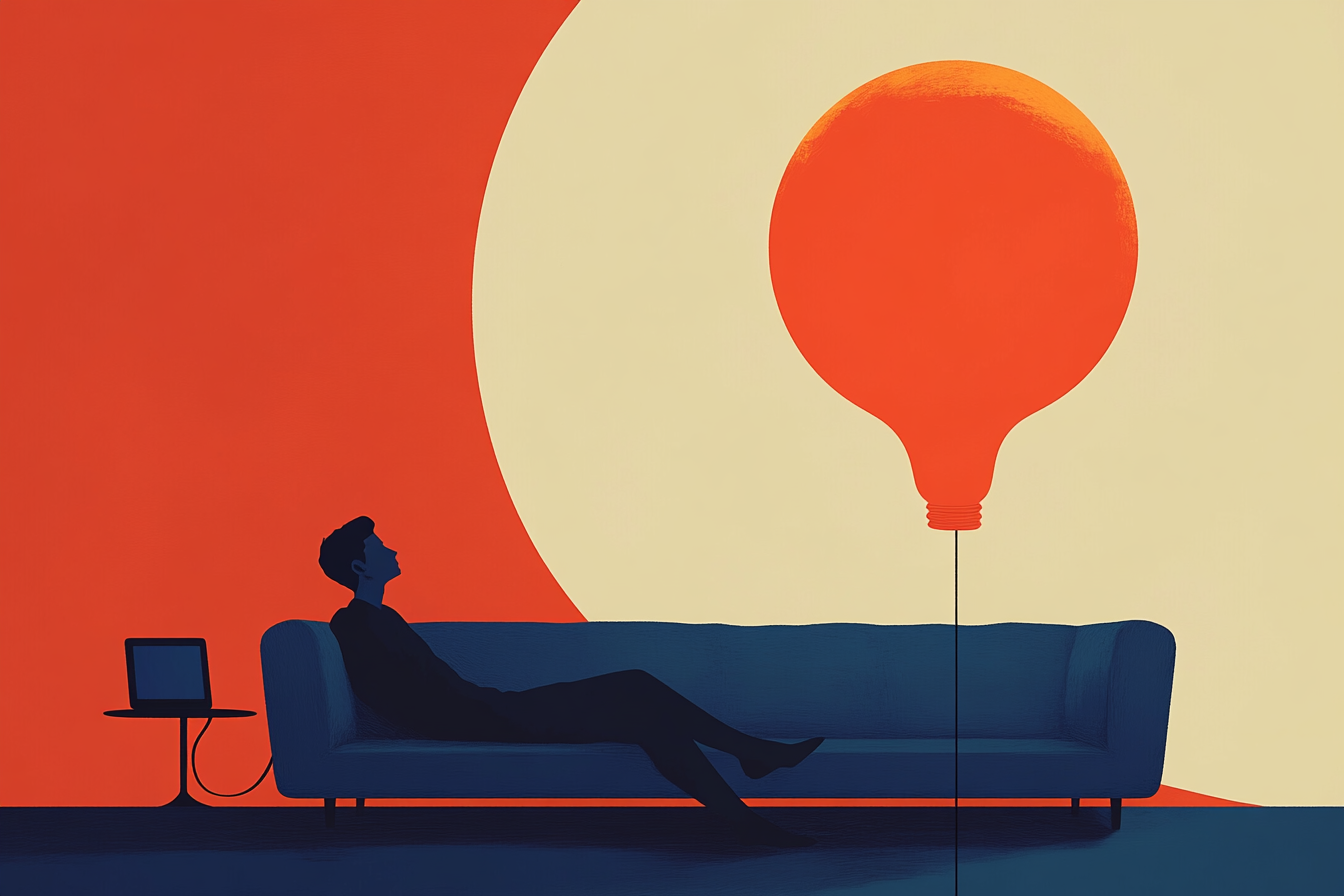How to Stop Being a Consumer and Become a Creator
There's a strange paradox that haunts every would-be creator: we're simultaneously terrified no one will ever see our work, and absolutely petrified that someone actually might.

I've lived with this contradiction for most of my life. In more recent times, it looked like scrolling mindlessly through social media while that little voice in my head whispered: "You should be making something instead of sitting here consuming all this." Then, when I finally sit down to create, the fear kicks in: "What if it's rubbish? What if people judge me? What if no one cares?"
It's this bizarre tension that keeps so many of us trapped in endless consumption mode. We know deep down we want to create - to write, record, build, design - but somehow we keep filling that time with more TikTok, more Netflix, more podcasts.
If you're nodding along right now, this article is for you. It's about breaking that cycle, overcoming the fear, and finally crossing that terrifying threshold from consumer to creator.
Prefer to listen? Here's the full episode
My own reluctant creator journey
A confession: despite working in the creator economy for five years now, this Creator Craft podcast is really the first consistent creative thing I've put out into the world. And getting started wasn't easy.
A few years back, some mates and I started working on a podcast called Hell's Theatre about cult movies, horror films, and weird stuff we were into. We recorded five or six episodes, but we made one critical error - we didn't publish after that first one.

Looking back, I think the first couple of episodes were decent, but it just kind of went downhill from there. We started trying way too hard to sound interesting. The chemistry died before we even got off the ground. And I really think it's because we didn't just put that first one out there. We overthought the whole thing.
Our logic for not publishing right away was, "Well, if people see it and there aren't enough episodes, they'll just judge us." But what we were really doing was protecting ourselves from putting something imperfect out into the world and living with the consequences. Realistically, no one was going to see those first episodes very quickly anyway!
The psychology behind creation paralysis
At the heart of what holds back would-be creators is fear, specifically, the fear of exposure and judgment. And honestly, that's probably just a pretty basic human thing.
There's a peculiar paradox at play. We're scared that no one will see our work, but we're also kind of terrified that people will see it.
The truth is, every creator you admire started somewhere, and their early work was probably pretty rubbish too. You can see it for yourself - go to YouTube, find your favourite creator, sort their videos by oldest to newest, and watch the first one. I bet it's nothing like their latest video.
And do you think they care? Of course they don't. Because they've been on this massive journey between then and now, and they are where they are because they took that first step and didn't give a f*** about the first video.
Creation starts as something selfish
I've come to believe that creation starts as something pretty selfish. It's an outlet for yourself. Later on, it becomes something for other people. But I think that creation really begins as this sort of personal act.
There's massive power in just being able to be okay with putting out a terrible first draft and setting super low barriers for yourself. Just accepting that the first thing you create is probably going to be not amazing, and that that's fine.
Part of the problem is that we're constantly consuming highly polished, professional content. So we naturally compare our beginner efforts to those of people who have been honing their craft for years. It's like watching Olympic swimmers and then being disappointed that you belly flop into the pool on your first go.
So, how do you break that cycle? How do you shift from consuming to creating? Here are some practical strategies that have worked for me and for others.
1. Set an input-to-output ratio
It's a simple idea, but it works: For every hour of consumption, commit to creating for 15-20 minutes.
The key thing here is that it doesn't need to be a big scary act of creation. It's just output that's the only requirement. It could be something as simple as recording voice notes with messy thoughts, scribbling in a journal, or sketching out some ideas.
The goal is to balance consumption with creation rather than letting consumption take over completely. Because consumption is easy. It's comfortable. And it's honestly stacked against us - we live in a world where everything is built around consumption. The television in your living room, the phone in your pocket, the notifications going off on your watch - it's all about getting your attention and getting you to consume.
What I'm asking you to do is to perform an act of self-love and force yourself to output at least a fraction of what you input. You might be at work for eight hours a day, outputting for someone else, but that's not really helping you - it's helping you get paid. If you have that itch in the back of your head that you need to create, set that simple ratio rule and don't let the algorithms win 100% of the time.
2. Consume with intent
Be mindful about the content you consume. When you do consume content, try to do it with a bit of purpose.
For me, that means being pretty selective about the podcasts I listen to, the newsletters I read, the YouTube channels I follow, and even the music I listen to. Sometimes I'll choose specific music just to create a certain mood or vibe for creation.
If you find yourself on a swipe-swipe-swipe algorithm, take some time out of that. Pick some content deliberately. You be the judge; you are the algorithm. No one can choose content better for you than you.
Find something that feeds into your need to create, that gives you inspiration and energy. It's really tough to be deliberate about consumption these days, but if you've got the fire in your belly to create something, try consuming content about people creating content. Listen to creator stories, study how they structure their work.
The algorithm really, really wants you to keep scrolling, but you can take back some control. Be intentional.
3. Start with small private acts of creation
Begin with something like a voice memo, maybe transcribe it, feed it into Claude or ChatGPT to help structure your thoughts. Just try to turn an idea that exists in your head into something that exists in the real world. That's it.
And the real world doesn't mean "out there publicly," to be clear. Do it in a really small way where there's no pressure.
One thing I've done is starting a blog on a random domain that I literally told no one about. I still do it, publishing there semi-regularly, and it's just become a place where I can put something out into the world. I don't even have analytics on it - that's how little I care about who reads it. The point is just to create something and publish it.
Actually, I started this before we started the Creator Craft blog. And the confidence from publishing something that almost assuredly no one is reading is slightly mind-bending. I don't understand exactly how it translates, but it did translate. There is something about the simple act of creating something, putting it out into the world, and not caring who reads it that just feeds that creative fire.
All of those "what ifs" that stand between a would-be creator and an actual creator just kind of dissolve as soon as you do it. Those doubts go away pretty quickly when you realize, "I got something out of this and nothing bad really happened."
4. Design your environment for creation
For me, the environment I'm in massively affects my ability to create.
I find it's really hard to sit and create something on the same couch where I spent hours scrolling through TikTok the previous night. Our brains associate spaces with behaviors. Get out of that space and get into a different space altogether.
If you consume in a particular space, go to another room in your house, find a little nook, or head to a cafe or a co-working space. Some hotels even have little co-working spaces you can use - you don't even have to be a guest. You just buy a coffee and that's you.
There are lots of opportunities to get out of that space where you consume and get into a new space that doesn't have any rules written for it. Because that's what it is, right? You sit down on the couch, and how quickly does your hand go to your mobile phone? How quickly does your thumb automatically swipe up and open TikTok or YouTube?
It's so fast. So break that cycle very easily by getting out of a space where the rule is "phone out, TikTok on" and go to a different space. It'll help your mental state. When you're in a different physical space, it's a lot easier to adopt a different mindset.
Your overall headspace matters too - from your morning routine to the stress in your life and loads of other factors. You can't control everything, but you can control what you do after that first cup of coffee in the morning. Are you going to sit on TikTok, or are you going to try and write 100 words to start your day? That is within your control.
5. Break down big dreams into small steps
This might be the most important of all the strategies, because often what paralyzes us is the sheer enormity of our ambitions.
I think we don't often stop to think enough about the space in between where we are now and where we want to get to. There aren't any shortcuts for becoming a creator - you have to go through the paces.
If your dream is to become a published author, sitting down to write a book feels overwhelming as hell. But writing 200 words of a micro-story? That feels a bit more doable.
I actually made a free tool to help with this called Dream Plotter. It exists at dream.itwasjacob.com - it's a simple tool with some AI happening in the background that helps you break down whatever your big creative goal is into manageable steps.
Here's how it works: You start by writing down your long-term goal - who you want to be in 5-10 years. Then you define where you are right now in context. The tool (or you, on paper) then plots out the incremental milestones needed between now and then to build yourself up and make that final dream possible.
For example, if your 10-year goal is to become a published author, here's how it might break down:
- Years 1-2: Enroll in an online creative writing course, learn narrative techniques, establish a daily writing routine of 500 words, engage with writing communities
- Years 3-4: Write and submit short stories or essays to literary journals, develop editing skills by partnering with freelance editors, draft outlines for book ideas
- Years 5-6: Attend literary events, build networking connections, complete a first full draft of your book manuscript, get feedback from beta readers
- Years 7-8: Choose between traditional publishing and self-publishing, prepare submissions or self-publishing plan
- Years 9-10: Publish your book
Everything is possible if you set the destination, are honest about where you're starting, and work out what some possible milestones are between that starting point and the end. What are some activities, what are some things that you can do to push that forward every week, every day?
A 7-day challenge to help you get started
If you're intrigued and want to try building something, here's a seven-day challenge to help you get started:
Day 1: Identify your big dream and honestly assess where you are right now. Write it down in a journal or use the Dream Plotter.
Day 2: Carve out just 15 minutes to create something tiny related to your dream. If you want to be a writer, write a paragraph. If you want to be a podcaster, record a one-minute audio clip. Nothing fancy.
Day 3: Find a new environment and create there for 20 minutes - a cafe, park bench, anywhere different from your usual consumption spaces.
Day 4: Audit your consumption. Look at what you've actually consumed in the past 24 hours and ask, "Is this really feeding my goal, or am I just filling time and distracting myself?"
Day 5: Bump up your creation time to 25 minutes and try a slightly different format or approach. Just mix it up a little.
Day 6: Share something you've created with just one trusted person. Not for validation, but just to get comfortable with the idea that your work can exist outside of your own head.
Day 7: Reflect on the week and plan the next steps. What worked? What didn't? What did you enjoy? What did you hate? How can you build this into something sustainable that you do every single week?
The magic is in the creation itself
Here's the thing - the magic of creation isn't actually in the distribution. Yes, income and career do come from distribution, to be fair. But the personal benefits, the fulfilment, the growth, developing your voice - that all comes just from the acts of creation themselves.
In the early days, the goal wasn't to build a massive audience or make money. It's simply a matter of going from 0 to 1, to start spending some of the time you currently use for endless scrolling on creation instead.
Marcus Aurelius, the Roman emperor and Stoic philosopher, kept a journal of his thoughts that we now read as the book "Meditations." And if journaling was good enough for literally the world's most powerful man at that time, it's probably good enough for you as a place to start with your creation, right?
What is your dream? What is the smallest step you could take today towards it? That first step is going to be the first of a hundred. It builds confidence, creates passion, and further fuels that fire in your belly.
I'd love to hear about your creator journey if you're feeling brave. Please do share what you create from this challenge with us, email us at [email protected], or keep it completely private. Whatever feels right for your stage of the journey.
The truth is, becoming an amateur creator is a privilege. It means you've already taken that hardest step - from consumer to creator. And that's what this is all about - taking that first step, then another, then another, until creating becomes as natural as consuming once was.

